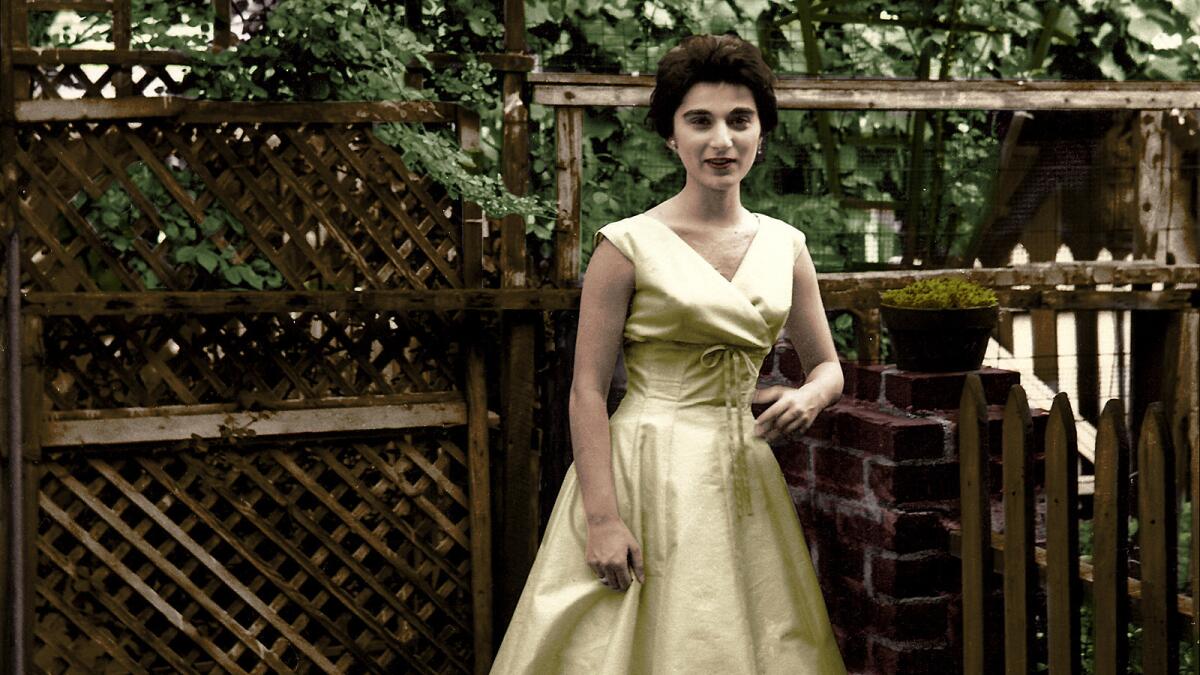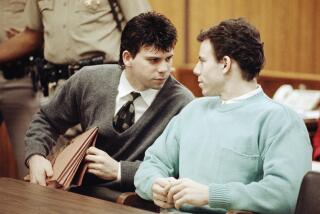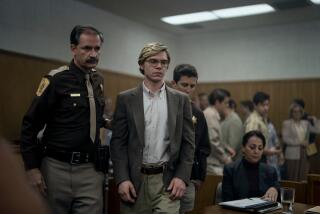Infamous Kitty Genovese murder case is retold and upended in new movie ‘The Witness’

Kitty Genovese at her grandparents’ house in Brooklyn, in James Solomon’s “The Witness.”
It was the crime of the century — or at least the sin of omission of the century.
As the New York Times reported on its front page of March 27, 1964, 38 residents of the city’s borough of Queens “watched a killer stalk and stab a woman [28-year-old Kitty Genovese] in three separate attacks” and “not one person telephoned the police during the assault.”
As it turned out, nearly every claim in that dramatic story was dubious, a fact that Bill Genovese, the victim’s brother, goes about exploring with a poignant obsessiveness a half-century later.
SIGN UP for the free Indie Focus movies newsletter >>
Just before 4 a.m. on a March day in 1964, Kitty Genovese was raped and murdered outside her apartment building by a man named Winston Moseley (he was convicted and remains behind bars). She screamed, “Save me” several times, but to little avail. No one in her building (it seemed) came to her aid or called police, despite the building being easily within earshot.
The story quickly went national, and Kitty Genovese became a symbol, still enduring today, of a populace indifferent to the suffering of others. But Bill Genovese wants to know whether the circumstances of his sister’s death were as cruel as that legend suggests or if, perhaps, a more complicated reality was at play.
His investigative efforts are chronicled in “The Witness,” a documentary that world-premiered at the New York Film Festival on Tuesday night. It is directed by James Solomon, writer of Robert Redford’s Lincoln assassination drama “The Conspirator.” And as with Solomon’s earlier work, it turns out there is much that is misremembered and misunderstood about a famous crime.
“ ‘The Witness’ is very much about a story we think we know,” Solomon said in an interview Tuesday morning. “And it’s also a film about the profound effect of a tragedy in a family’s life. It’s such a public event that in many ways it erased Kitty’s life within the family.” Indeed, many of Kitty Genovese’s siblings and their children have put the murder behind them, to the point that one grown niece first found out about the story in her high school class.
That offers a dichotomy with Bill Genovese, who hasn’t stopped thinking about the killing for 50 years. And it creates an interesting thematic subtext: Is a brutal tragedy something to move on from or hunker down in?
Even the latter approach here, it must be said, is not one of paralyzing self-pity. Genovese sets about finding the witnesses and their descendants with a detective’s zeal, lending the movie a procedural feel that is both suspenseful and surprising. Without giving away too much, it turns out that many of those newspaper claims were indeed inaccurate; there were responses to Kitty Genovese’s plea, and they took various, in some cases heartening, forms.
The second half of the film then turns toward the Genovese family itself, shedding light on its enigmatic subject. Kitty Genovese is a name that has become so calcified as a symbol even people who recall the case well couldn’t tell you much about her. As it turns out, she was a complex person — a well-known local barmaid who may have moonlighted as a bookie and also was a lesbian at a time when it was far less accepted, living with a roommate few knew was also her lover. “My sister,” Bill Genovese says, “was so much more than her last 30 minutes.”
The film’s subject admits he has become obsessed with the case but tells his skeptical family it’s something he may not be able to ever fully stop asking questions about. Genovese is a Vietnam veteran who lost both his legs in the war. He went forth to fight instead of seeking an exemption because he believed, and was motivated by, the original reporting of inaction in his sister’s murder. As Genovese says to one interview subject, “I grew up and moved in certain directions believing it was fact.” (He was 16 at the time of the attack and lived at home with his parents in Connecticut; he was especially close with Kitty, who would visit on weekends.)
Solomon directs “The Witness,” which is seeking distribution at the festival, with a kind of sober detachment that enhances the shock and melancholy. There is no voice-over from the filmmaker, and he makes up for the lack of archival footage with minimalist animation. Solomon has been working on the film for more than a decade. (He initially was turned on to it, and to Bill Genovese, when he began helping research an HBO feature project with Joe Berlinger; it never came to pass, but he and Bill formed a relationship that led to this film.)
The director, who suffered a kind of parallel loss as he was making the movie, says he sees the circumstances of the Kitty Genovese case as being not just about the moral goodness of the American people, but the way memory and truth can be quickly clouded, especially when tragedy is involved.
“It’s elusive to know what actually happens even in your own experience,” he said. “I think that’s what the film is in a sense: Bill gathering all these narratives and trying to make sense of them.”
Genovese comes off as a paragon of patience and thoughtfulness. When he seeks out Moseley to try to understand what was going through the killer’s mind, Moseley and his family react in startling ways. The even keel Bill Genovese maintains in the face of that borders on the unbelievable.
“The Witness” also explores questions of media judgment, underscoring that if the current era of the 24-hour news cycle is guilty of quick judgments and porous journalism, it hardly holds a monopoly on such problems. It’s eye-opening that no other outlet at the time questioned the New York Times’ claims of inaction.
In that sense, the movie serves as a kind of mirror image to the upcoming “Spotlight,” in which print journalists are seen as the truth-revealing shoe-leather heroes. It also has echoes of the Rolling Stone/University of Virginia rape-story scandal, with no less a figure than Mike Wallace saying that not a single reporter followed up on the claims about the Genovese witnesses because they were made by the New York Times. (The paper revisited its story about a decade ago and amended its original reporting.)
Even the most diligent personalities investigating the story, though, may still come up short in the end. “I’ve come to realize that the whole truth about Kitty’s death will never be known,” Genovese says toward the end of the film. “But maybe that’s why the story continues to fascinate people.” “The Witness” compellingly makes that case.
Twitter: @ZeitchikLAT
More to Read
Only good movies
Get the Indie Focus newsletter, Mark Olsen's weekly guide to the world of cinema.
You may occasionally receive promotional content from the Los Angeles Times.







